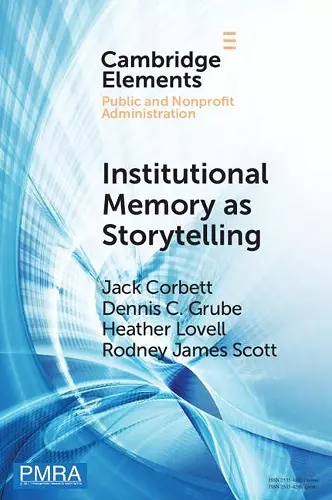Institutional Memory as Storytelling
How Networked Government Remembers
Jack Corbett author Dennis Christian Grube author Heather Caroline Lovell author Rodney James Scott author
Format:Paperback
Publisher:Cambridge University Press
Published:24th Dec '20
Currently unavailable, and unfortunately no date known when it will be back

When institutions forget they repeat mistakes. This Element explains why institutional memory is important and how it can be improved.
How do bureaucracies remember? They reside with people and are thus dispersed across the array of actors that make up the differentiated polity. Drawing on four policy examples from four sectors, this Element argues that treating the way institutions remember as storytelling is both empirically salient and normatively desirable.How do bureaucracies remember? The conventional view is that institutional memory is static and singular, the sum of recorded files and learned procedures. There is a growing body of scholarship that suggests contemporary bureaucracies are failing at this core task. This Element argues that this diagnosis misses that memories are essentially dynamic stories. They reside with people and are thus dispersed across the array of actors that make up the differentiated polity. Drawing on four policy examples from four sectors (housing, energy, family violence and justice) in three countries (the UK, Australia and New Zealand), this Element argues that treating the way institutions remember as storytelling is both empirically salient and normatively desirable. It is concluded that the current conceptualisation of institutional memory needs to be recalibrated to fit the types of policy learning practices required by modern collaborative governance.
ISBN: 9781108748001
Dimensions: 150mm x 230mm x 5mm
Weight: 130g
78 pages